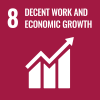Hirat, 27 February 2023 – The sound of a hammer ceaselessly pounding, and the distinctive smell of sung metal can reach you before you even enter Gholam’s gas stove production workshop. He beams at his staff – returning migrants and host community members alike – working hard to produce gas stoves, fans, handicrafts, and more.
Gholam has had a long journey to become the successful businessman he is today.
After his father died, Gholam and his brothers began working in a gas stove manufacturing company, where he acquired his first skills in entrepreneurship and manufacturing.
“I was eight years old when we left for Iran and 21 when we returned. We arrived in Afghanistan with nothing and had to start from scratch,” Gholam recalls. “A friend introduced me to a gas stove production company near the city of Hirat where I began to work again.”
However, in 2015, the country’s security and economic situation created such little market demand that Gholam was forced to consider leaving again. This was at a time when thousands of migrants from Afghanistan, Iran, Iraq, and Syria were fleeing to Europe in search of a better life.
Gholam decided to take his family to Türkiye, but they struggled to get by. Although Gholam’s dream was to reach Europe, he did not want to enlist the help of smugglers and endanger his family, so they eventually moved back to Afghanistan in late 2018.

Gholam (left) and his staff work hard to produce gas stoves, fans, handicrafts, and more. Photo: IOM/Léo Torréton
Gholam was forced to start from zero yet again and had, in the meantime, lost contact with the local market. With barely enough money to make ends meet, he relaunched his gas stove manufacturing business.
Then the COVID-19 pandemic hit in early 2020. Imports from neighbouring countries such as China and Iran came to a screeching halt and many businesses collapsed or were on the brink of bankruptcy. It was then that Gholam heard about the business support offered by the International Organization for Migration (IOM) at an awareness-raising event with the Community Development Council (CDC) in Jebreil township of Hirat province.
Following an eligibility assessment, IOM deemed Gholam’s business as having potential for growth. Soon after, he received new machinery – on which 80 per cent of his business relies – and a cash grant which enabled him to pay staff salaries and invest further.
CDCs contribute significantly to the community’s welfare, as they form a vital link between returnees, internally displaced persons (IDPs), and host communities and employment opportunities. Today, Gholam heads one of Hirat’s 675 CDCs through which he supports 250 households with conflict resolution, reintegration, and referrals.

Community Development Councils (CDCs) form a vital link between returnees, internally displaced persons, and host communities and employment opportunities. Photo: IOM/Léo Torréton
Jebreil township hosts the highest number of returnees and IDPs in Hirat, approximately 248,000, according to IOM’s Displacement Tracking Matrix. Many of them are living together under one roof to share rental costs. According to CDC data, roughly 500 families are currently house-sharing in Jebreil.
Zahra, a 28-year-old mother of three from Samangan province, spent four days at the border before returning to Afghanistan. “We spent all the money we had on the journey. We had nothing when we arrived in Hirat,” she explains.

With CDC support, Zahra, a 28-year-old mother of three, now shares a home with two other displaced families. Photo: IOM/Léo Torréton
With CDC support, Zahra now shares a home with two other displaced families, paying USD 15 per month. There are 18 people sharing one small kitchen with two gas stoves, and one outdoor toilet. During the day, a plethora of activities takes place in the single common area: women create handicrafts or clean pistachios, looking at children play, while others sit idly by, waiting for the next day’s employment opportunity.
With the current harsh economic landscape, it is essential to foster vulnerable people’s livelihoods to ensure that they can afford better living conditions. A way to do that is through the promotion of opportunities for apprenticeships and vocational training as well as support for small to medium enterprises that show growth potential, such as Gholam’s.
“I hope to be able to grow my business further and create jobs that will help people support their families. I will start slow, but I hope to reach 1,000 families,” explains Gholam.

It is essential to foster the livelihoods of vulnerable people like Zahra to ensure that they can afford better housing opportunities. Photo: IOM/Léo Torréton
By supporting local economies via skills development and injecting cash into existing and start-up businesses, IOM aims to build a resilient and cohesive environment for returnees, IDPs, and host communities alike. Further funding will be needed to maintain the hard-earned momentum gained by IOM and its partners and to continue fostering the resilience of Afghan migrants.
In the last five years, IOM has supported 524 businesses with cash grants and in-kind assistance which has led to the creation of 10,353 jobs and the retention of 1,924 existing jobs.
This story was written by Léo Torréton and Lauriane Wolfe, IOM Afghanistan Media and Communications Unit. For more information, please contact ltorreton@iom.int.
If you are interested in donating to relief efforts in Afghanistan, please visit IOM's fundraising page.



